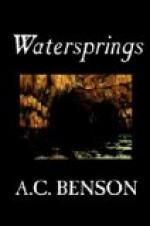Howard used to grumble a little over this to Mrs. Graves. “Yes,” she said, “if Frank were not so really unselfish a man, he would be a bore of purest ray serene; but his humanity breaks through. I made a compact with him long ago, and told him plainly that there were certain subjects he must not talk to me about. I suppose you couldn’t do that?”
“No,” said Howard, “I can’t do that. It’s my greatest weakness, I believe, that I can’t say a good-natured decisive thing, until I am really brought to bay—and then I say much more than I need, and not at all good-naturedly. I must get what fun out of Frank I can. There’s a good deal sprinkled about; and one comfort is that Maud understands.”
“Yes,” said Mrs. Graves, “she understands! I know no one who sees weaknesses in so absolutely clear a light as Maud, and who can at the same time so wholly neglect them in the light of love.”
“That’s good news for me,” said Howard, “and it is absolutely true.”
XXIX
THE CHILD
The day on which Howard learned that Maud would bear him a child was a day of very strangely mixed emotions. He saw how the hope dawned on the spirit of Maud like the rising of a star, and he could rejoice in that with whole-hearted joy, in the mere sharing of a beautiful secret; but it was strange to him to see how to Maud it seemed like the realisation and fulfilling of all desire, the entering into a kingdom; it was not only the satisfaction of all the deepest vital processes, but something glorious, unthinkable, the crowning of destiny, the summit of life. There was no reasoning about it; it was the purest and finest instinct. But with Howard it was not thus. He could not look beyond Maud; and it seemed to him like the dawning of a new influence, a new fealty, which would almost come in between him and his wife, a division of her affections. She seemed to him, in the few tremulous words they spoke, to have her eyes fixed on something beyond him; it was not so much a gift that she was bringing him as a claim of further devotion. He realised with a shock of surprise that in the books he had read, in the imagined crises of life, the thought of the child, the heir, the offshoot, was supposed to come as the crown of father’s and mother’s hopes alike, and that it was not so with him. Was he jealous of the new claim? It was something like that. He found himself resolving and determining that no hint of this should ever escape him; he even felt deeply ashamed that such a thought should even have crossed his mind. He ought rather to rejoice wholly and completely in Maud’s happiness; but he desired her alone, and so passionately that he could not bear to have any part of the current of her soul diverted from him. As he looked forward through the years, it was Maud and himself, in scene after scene; other relations, other influences, other surroundings might fade and decay—but children,




